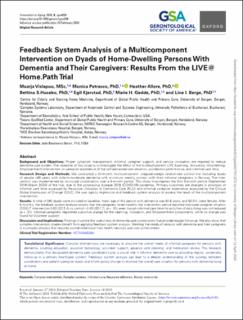| dc.description.abstract | Background and Objectives: Proper symptom management, informal caregiver support, and service innovation are required to reduce dementia care burden. The objective of this study is to investigate the effect of the multicomponent LIVE (Learning, Innovation, Volunteering, Empowerment) intervention on caregiver experience of the self-perceived care situation, coordinator performance, and informal care time.
Research Design and Methods: We conducted a 24-month multicomponent, stepped-wedge randomized control trial including dyads of people ≥65 years with mild-to-moderate dementia with minimum weekly contact with their informal caregivers in Norway. The intervention was implemented by municipal coordinators over a 6-month period. This study investigates the first 6-month period (September 2019–March 2020) of the trial, due to the coronavirus disease 2019 (COVID-19) pandemic. Primary outcomes are changes in provision of informal care time assessed by Resource Utilization in Dementia Care (RUD) and informal caregiver experience assessed by the Clinical Global Impression of Change (CGIC). We use logistic regression and feedback system analysis to assess the reach of the multicomponent intervention.
Results: A total of 280 dyads were included at baseline, mean age of the person with dementia was 81.8 years, and 62.5% were female. After 6 months, the feedback system analysis reveals that the caregivers randomized to the intervention period reported improved caregiver situation (CGIG-T: intervention 0.63 (SD 2.4) vs control −0.43 (SD 1.7), p < .01), even though informal care time for activities of daily living was not reduced (p = .31). Informal caregivers registered a positive change for the Learning, Innovation, and Empowerment components, while no change was found for Volunteer support.
Discussion and Implications: Findings illustrate the usefulness of dementia care coordinators that provide regular follow-up. We also show that complex intervention studies benefit from applying feedback system analysis. Meeting the needs of persons with dementia and their caregivers is a complex process that requires coordinated input from health services and user communities. | en_US |

